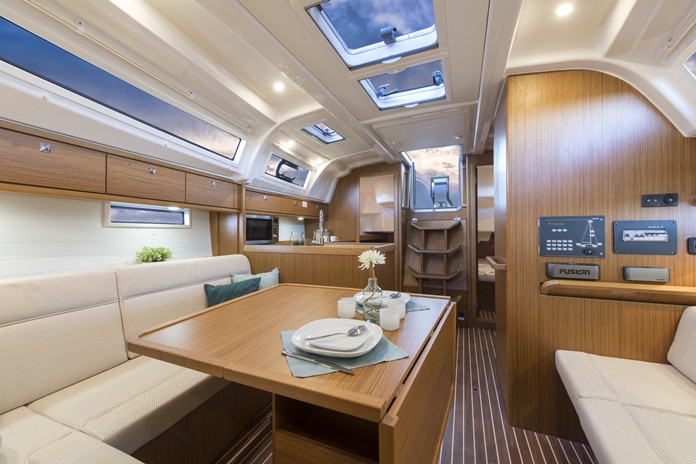Yacht Surveyors
The way to find the best surveyor in your area is to ask people who know and are willing to give you an honest answer. Insurance agents, company claim offices and yard managers are in a good position to know which surveyors know their business. If you want a good surveyor, choose your surveyor carefully.

The next most important consideration is to make sure that the surveyor has adequate time to do his job, along with good working conditions. The surveyor can’t do a good job if he’s being hustled by a seller. Nor can he do a good job if too many people are present on the boat. As the buyer, you should accompany the surveyor so that you’re available to see things first hand. Sea trials should be conducted in open water not restricted waterways. A brief run up a river or the Intracoastal, interspersed with no wake zones won’t do. If weather conditions don’t permit an open water run, be prepared to reschedule another day. It’s extremely important to give the vessel a good run.

After the survey, avoid letting a broker rush your decision. They all say that if you don’t sign today, they got someone who will tomorrow. It’s the oldest con in the book. Surveyors need time to consider their findings, and the survey is not really finished until he has written his report. Most surveyors get their reports done in a day or two, so give him adequate time to finish his job.
Purchase Agreements
Make sure that your purchase agreement allows you to cancel the deal if the vessel does not meet your standards. Include a stipulation that the sea trial must be conducted in open water for a minimum of two hours.
If the seller warrants that he will repair any defects, make sure that you get that in writing, preferably with a maximum dollar amount attached. It is not wise to allow the seller to repair deficiencies himself. The reason should be obvious, but many buyers overlook the possibility that the repairs that the seller makes may not be satisfactory. Indeed, they often aren’t. The best procedure is to negotiate a dollar reduction to the sales price and make the repairs yourself, even if there is an element of uncertainty as to cost. Of course you should get cost estimates on deficiencies, and better still a contract price.
If you can’t get away from the seller making repairs, at least stipulate in the contract that the repair firm must be mutually agreeable to both buyer and seller. What you’re looking to avoid is the shade-tree mechanic who doesn’t do the job right.
Remember that the broker represents the seller, not you, the buyer. If you want to believe their representations, make them put it in writing. That way you have a contract, not just a sales pitch.
Concluding the Deal
Don’t be too quick to condemn an otherwise good boat that has a major problem such as a bad engine. If you’ve done your homework and have researched more than just a few boats, you know what is available and at what price. The old saying that the devil you know is better than the one you don’t applies. If you can get serious defects repaired well within economic range, you’ll probably end up with a better boat than the next one you look at. The reason is simple: if the problem has manifested, it has become known. When you’re looking at boats of comparable age, chances are those boats are also well on the way to having similar problems. Therefore, the more problems that can be discovered and repaired, the better off you’ll be.
In Summary:
- Make quality a major consideration. Don’t try to get the largest vessel that your budget will allow. Better to take a step down in size and a step up in quality.
- If size is a major consideration, seriously consider used versus new as a means of staying within your budget.
- Look beyond glamorous interiors, luxurious upholstery and racy designs: the beauty may only be skin deep.
- Calculate the full cost of ownership, including depreciation, interest, insurance, dockage, fuel and repairs. Figure maintenance as an annual percentage over the period of ownership.
- Once you’ve decided on several possibilities, take a tour of a marina or boat yard and see how the products of those builders hold up over the years. Talk to their owners and see what they have to say.
- Consult a surveyor before you buy. Most surveyors will be glad to help you make a choice.
- Take the time to find the best surveyor in your area.
- Make your purchase decision only after you’ve read the survey report.
- Consider the advantage of getting major machinery or parts overhauled or replaced based on a reduction in price.
Now I know what to buy, What next?
Now that you have chosen your boat, there are still two major options. The first, buying your boat overseas or a new boat and having it imported and the other is buying a boat that is already local in Thailand. Let’s take a look at both scenarios.
Import your boat:
It’s ‘easy’ when you know how but persons intending to import and/or register a boat in Thailand are advised to seek competent professional advice.
A pleasure yacht (power or sail) can be imported into Thailand with Customs Duty at zero percent. The only tax applicable is VAT, currently set at 7%. VAT will be calculated on the CIF value (Cost + Insurance + Freight) of the boat.
For the purpose of calculating VAT, the boat is valued at its purchase price. However, the Customs Officer must agree that value stated is a fair market price. If the Customs Officer believes the stated value is too low, he will research the price on www.yachtworld.com and may reject the importer’s own valuation, even if backed by a Bill of Sale/invoice/receipt etc.
The above applies to both new and pre-owned boats. In the latter case, there is room for negotiation on value depending on the boat’s condition.
Procedures, and the documentation required, are complicated. Employing a professional agency such as Gulf Charters Thailand will remove a lot of the frustration.
Buying local:
When transferring registration of a Thai registered boat, the Harbour department charges a stamp duty of 0.5% of the purchase price to make the transfer. He or she will also need a valid address in Thailand to reference in the yacht registration book.
The immigration office facilitates this by issuing a letter stating that you have provided them with proof of a residential address. To do this you need to attend a brief meeting with the immigration office and provide them with such proof, a lease or the like in your name. You will also require a passport photo and a copy of your passport showing the data page, the page showing your current visa and the a copy of the arrival card.
Please note that this letter is only valid for the duration of your visa, if you do not have sufficient time left on your visa for the registration transfer to take place (minimum two weeks) you may be required to provide a new valid letter to the Harbour department before they will issue the registration book.
After having received all documents complete, the Harbor Department will issue an official number to be clearly displayed on the left and right sides of the hull. Photographs of the vessel with the official Harbor Department number (2 photographs each on the left, on the right and the front) must be submitted to the Harbor Department who will then make a final detailed inspection and issue official registration papers and a permit to operate the vessel in Thai waters. If all documentation is correct, it will take 3 – 5 days.
For more information and advice about purchasing a new or used yacht/pleasure boat in Thailand, contact Gulf Charters on Tel. 038 237 752.



